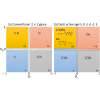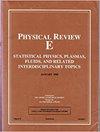成对社会两难博弈的稳定性:破坏性代理、建设性代理及其联合效应
IF 2.4
3区 物理与天体物理
Q1 Mathematics
引用次数: 0
摘要
选择退出博弈并不分青红皂白地伤害他人的破坏性行为主体,自相矛盾地促进了合作,是自愿参与策略的一个有趣变体。然而,人们对它们对合作的影响仍然了解不足,尤其是在成对社会两难博弈的背景下,以及与选择退出博弈但不分青红皂白地使他人受益的建设性代理人相比。此外,人们对这两种代理类型对合作动态的综合影响知之甚少。通过在无限且混合良好的种群中使用复制器动力学,我们发现,与破坏性代理在多人游戏中促进合作的作用相反,破坏性代理在成对社会困境中并不能鼓励合作。相反,它们在囚徒困境和猎鹿游戏中取代了叛逃。同样,在吃鸡游戏中,破坏性代理可以破坏或取代合作与叛逃的混合平衡,破坏和谐(琐碎)游戏中的合作。相反,当建设性博弈者的回报超过他们对对手的贡献时,他们会表现出与破坏性博弈者类似的效果。然而,如果他们的报酬较低,虽然他们会破坏囚徒困境和猎鹿博弈中的叛逃,却不会破坏和谐博弈中的合作均衡,而且对吃鸡博弈中的合作共存影响微乎其微。破坏性代理和建设性代理的结合不会促进合作,反而会产生复杂的演化动态,包括双稳态、三稳态和四稳态,其结果取决于它们的相对回报和博弈类型。这些结果合在一起,加深了我们对自愿参与机制对合作的影响的理解,有助于我们更全面地认识自愿参与机制的影响。本文章由计算机程序翻译,如有差异,请以英文原文为准。

Stability of pairwise social dilemma games: Destructive agents, constructive agents, and their joint effects
Destructive agents, who opt out of the game and indiscriminately harm others, paradoxically foster cooperation, representing an intriguing variant of the voluntary participation strategy. Yet, their impact on cooperation remains inadequately understood, particularly in the context of pairwise social dilemma games and in comparison to their counterparts, constructive agents, who opt out of the game but indiscriminately benefit others. Furthermore, little is known about the combined effects of both agent types on cooperation dynamics. Using replicator dynamics in infinite and well-mixed populations, we find that contrary to their role in facilitating cooperation in multiplayer games, destructive agents fail to encourage cooperation in pairwise social dilemmas. Instead, they replace defection in the prisoners' dilemma and stag-hunt games. Similarly, in the chicken game, they can destabilize or replace the mixed equilibrium of cooperation and defection, undermining cooperation in the harmony (trivial) game. Conversely, constructive agents, when their payoffs exceed their contributions to opponents, can exhibit effects similar to destructive agents. However, if their payoffs are lower, while they destabilize defection in prisoners' dilemma and stag-hunt games, they do not disrupt the cooperation equilibrium in harmony games and have a negligible impact on the coexistence of cooperation in chicken games. The combination of destructive and constructive agents does not facilitate cooperation, but instead generates complex evolutionary dynamics, including bistable, tristable, and quadstable states, with outcomes contingent on their relative payoffs and game types. These results, taken together, enhance our understanding of the impact of the voluntary participation mechanism on cooperation, contributing to a more comprehensive understanding of its influence.
求助全文
通过发布文献求助,成功后即可免费获取论文全文。
去求助
来源期刊

Physical review. E
物理-物理:流体与等离子体
CiteScore
4.60
自引率
16.70%
发文量
0
审稿时长
3.3 months
期刊介绍:
Physical Review E (PRE), broad and interdisciplinary in scope, focuses on collective phenomena of many-body systems, with statistical physics and nonlinear dynamics as the central themes of the journal. Physical Review E publishes recent developments in biological and soft matter physics including granular materials, colloids, complex fluids, liquid crystals, and polymers. The journal covers fluid dynamics and plasma physics and includes sections on computational and interdisciplinary physics, for example, complex networks.
 求助内容:
求助内容: 应助结果提醒方式:
应助结果提醒方式:


